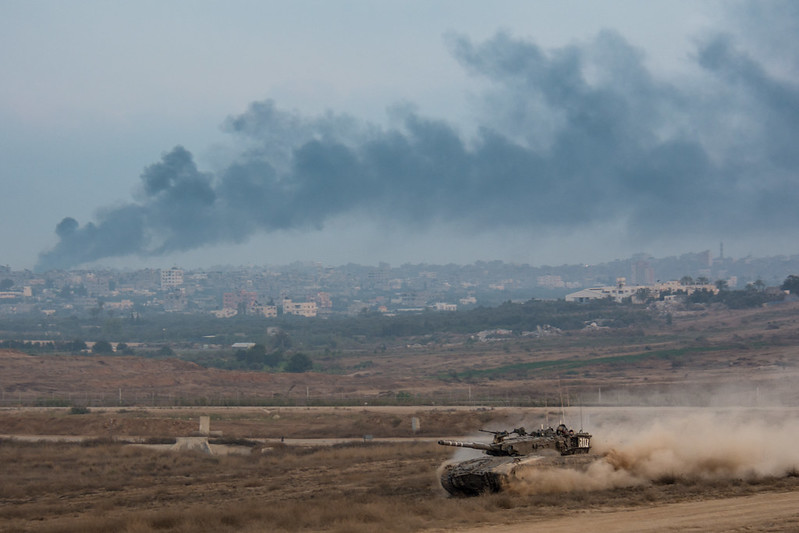For more than two weeks, Israeli tanks have been positioning themselves along the Gaza border in what has been widely described as the “largest pull-up” of Israeli forces in the occupying state’s history.
The Gulf Cooperation Council joined global condemnations of Israel’s planned ground invasion of Gaza on Saturday, warning of serious humanitarian and security consequences as the Palestinian death toll surpassed 8,000.
In a statement, the GCC’s Secretary General Jassem Albudaiwi condemned the Israeli escalations in Gaza “and warned of the humanitarian and security consequences of any ground operations conducted by the Israeli occupation forces on Palestinian civilians.”
“His Excellency stated that this escalation constitutes a violation of international law and international humanitarian law, as well as the resolution of the United Nations General Assembly issued on October 27, 2023, which calls for an immediate ceasefire and the implementation of a humanitarian truce,” the GCC said.
With Israel’s war on Gaza nearing one month, Abudaiwi further stressed “that the absence of a political solution has led to the worsening of conditions and the destruction of infrastructure and vital interests in the Gaza Strip.”
The statement on Saturday came after Israel launched its most intense bombardment of the besieged Gaza Strip in preparation for its announced plans to wage a full-blown ground invasion into the Palestinian enclave.
On Friday, Israeli occupation forces (IOF) unleashed their most lethal attack on Gaza since the start of the war, cutting off all communications in the Strip and intensifying its bombing campaign on the 2.3 million local population.
On Sunday morning, local journalists said telephone and internet connection made a gradual return.
Gaza’s government media office confirmed last week that Israel has dropped more than 12,000 tonnes of explosives on the Strip since the start of the war—equivalent to the United States’ nuclear bomb that was dropped on Hiroshima in 1945.
Within 23 days, Israel has killed more than 8,000 people in Gaza, 3,195 of which are children. More than one million people have been internally displaced, the majority of which are taking shelter in hospitals and schools.
Israel has repeatedly threatened Palestinian residents to flee to the south of Gaza despite also bombing those alleged safe zone.
On Saturday, Israeli Prime Minister Benjamin Netanyahu said the war will be “long and difficult” and confirmed the launch of the next stage of the war.
For more than two weeks, Israeli tanks have been positioning themselves along the Gaza border in what has been widely described as the “largest pull-up” of Israeli forces in the occupying state’s history. As the main backer and ally of Israel, the US has been helping the IOF expand its operations militarily.
On Friday, the Al Qassam Brigades, Hamas’s armed wing, said they “foiled an Israeli ground incursion into Beit Hanoun and the east of Bureij” where it reported violent clashes.
The Al Qassam Brigades’ spokesman Abu Obeida then said on Saturday that the era of the “collapse of the Israeli occupation entity” has begun and that the Palestinian Resistance had shattered the illusions surrounding the “invincible Israeli Army” and the “mighty Merkava tank.”
Prisoner exchange talks ongoing
Tel Aviv has used the Palestinian resistance operation of 7 October to justify its massacres in Gaza. The unprecedented Hamas attack on Israel led to the capture of more than 200 Israeli captives, all of whom were believed to be taken into Gaza.
Netanyahu has faced mounting pressure in recent weeks from families of the captives, many of which have launched protests demanding urgent action to retrieve them.
However, Hamas has since confirmed that Israel’s bombardments on the Strip has killed nearly 50 captives so far. Heavyweight diplomatic power Qatar, which hosts a Hamas political bureau, has been at the forefront of de-escalation efforts and talks to release the captives.
On 20 October, Qatar’s diplomatic role proved to be successful with the release of two American captives, identified as Judith Raanan and Natalie Raanan—a mother and a daughter, from Hamas.
Then on Monday, Qatar and Egypt pushed for the release of two elderly women from Hamas, both identified as 79-year old Nurit Yitzhak and 85-year-old Yocheved Lifshitz.
Despite the breakthrough in the talks, the Gulf state has stressed that non-stop escalations have made its mediation much more difficult.
In an interview with Sky News on Thursday, Qatar’s Minister of State for Foreign Affairs Dr. Mohammed Al Khulaifi provided an insight into Doha’s latest diplomatic tussle.
“With this violence increasing everyday, with this bombing continuous everyday our task has become even more difficult. But despite that, we remain hopeful, we remain committed to our role of reaching out to the parties with the aim of reaching a positive result,” he said.
He added: “In any normal scenario, if the mediator wants to perform its task in the best way possible, we need to reach a period of calm, we need to reach a period where we can speak logically to both sides and come up with positive initiatives on that.”
Meanwhile, Hamas said on Saturday that it is ready to release all captives if Israel releases all Palestinian prisoners.
“The large number of enemy prisoners we have is the price of emptying all prisons of all [Palestinian] prisoners,” Abu Obeida said.
There are at least 1,264 administrative detainees and 170 child prisoners behind Israeli bars, per figures shared by Palestine’s Addameer Prisoner Support and Human Rights Association.
Multiple reports from Palestinian activists on the ground said that Israel has increased its torture of Palestinians behind bars while cutting them off from water, electricity and food.







